

Shortname: (TPO) = TipitakaPali.Org or Tipitaka Pali Online
Tipitakapali.org and its offline apps aim to offer a simple and pleasant way to read and learn Tipiṭaka Pāḷi. They include helpful Pāḷi and Sanskrit dictionaries, as well as full-text search features.
The Pāḷi Roman text on Tipitakapali.org follows the latest Chaṭṭha Saṅgāyana Tipiṭaka (CST) - Official VRI Edition. The most recent update by VRI, including typo corrections and other improvements, was in Aug 2024. We strive to stay in sync with VRI updates, ensuring you always have access to the latest corrections.
Tipitakapali.org offline software is available for all major platforms: Windows, macOS, Linux, Android, and iOS.
1. Mobile Apps:
Android APK: If your Android powered devices do not have Google Play Store, you may find and download the Tipitaka CST APK file directly from
2. Desktop Apps:
Log: Tipitakapali.org version 0.0.1 (= v24.6.21) is released on 2024.06.21Most items are “click-able”
Most of what you see on the screen are self-explaining and click-able. Simply click or tap on them to discover the functions.
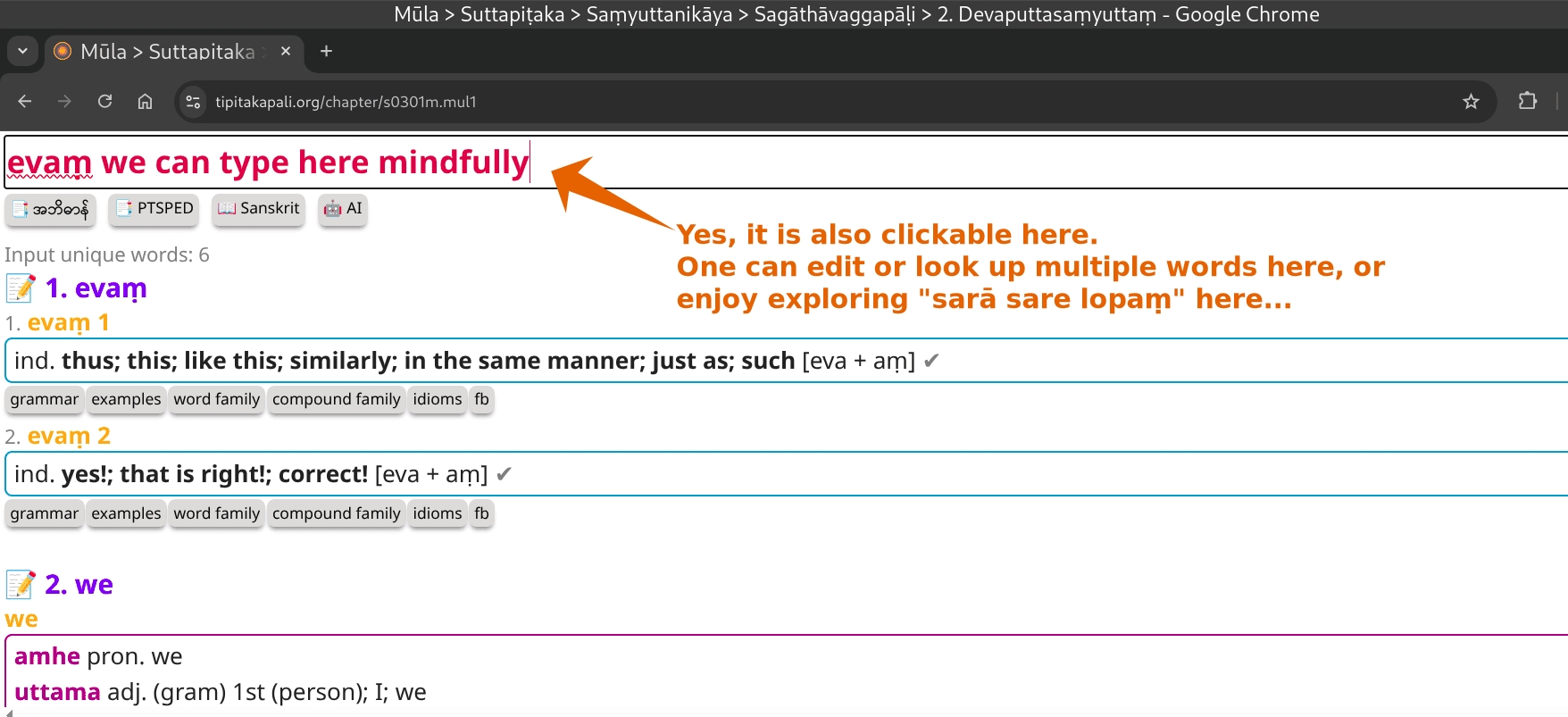
Customised Velthuis typing scheme for typing Roman pāḷi:
| type - | -> get | type - | -> get |
|---|---|---|---|
| aa | ā | ii | ī |
| uu | ū | m.. | ṁ |
| .m | ṃ | .n | ṇ |
| .d | ḍ | .l | ḷ |
| .r | ṛ | .s | ṣ |
| s.. | ś | .t | ṭ |
| ,,n | ñ | n.. | ṅ |
🤖 AI translation botAvailable on the online web app only, clicking on 🤖 AI buttons may provide helpful translations or a few amusing moments as you read its output.
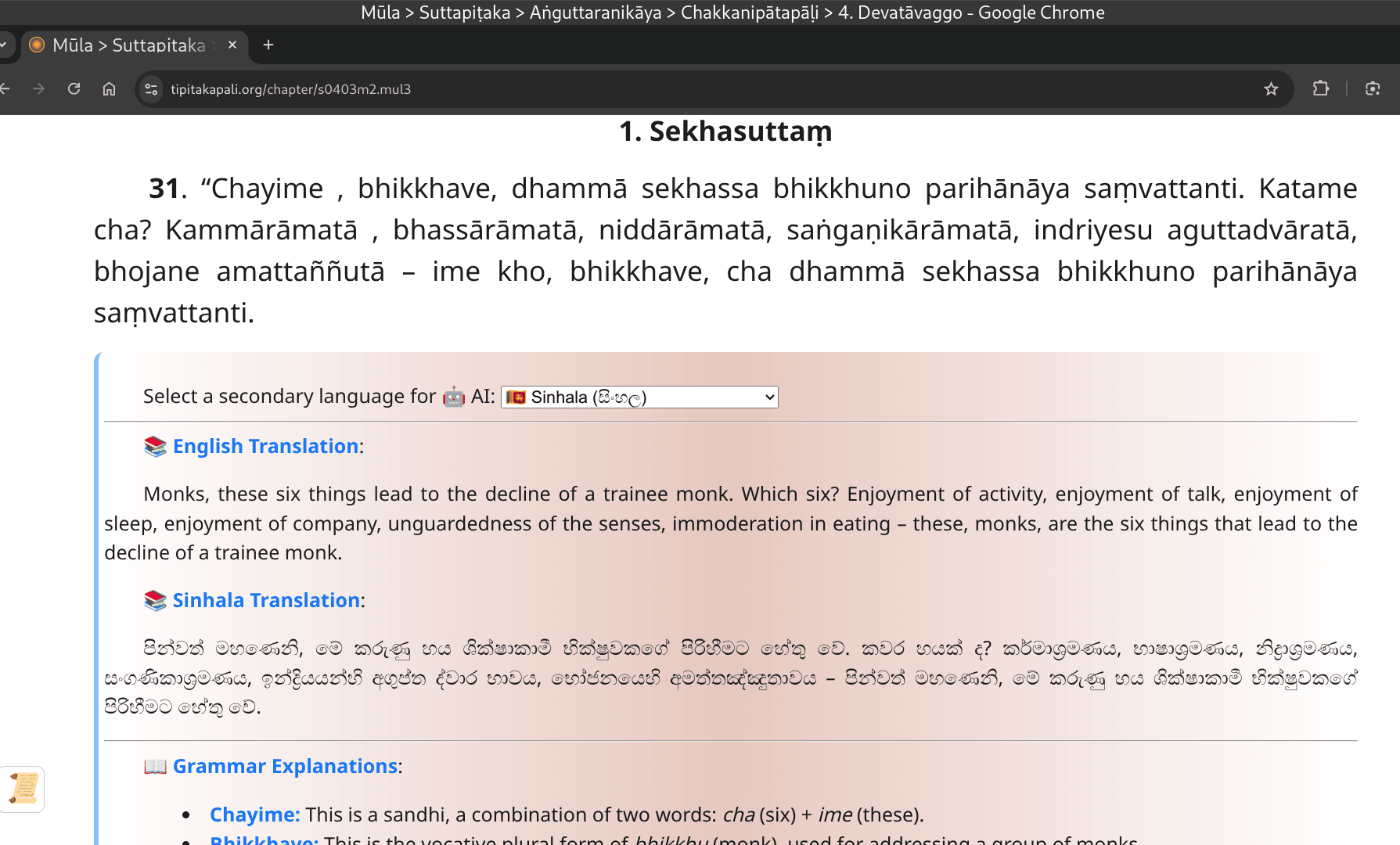
The full-text search works like Google search. Check out the search mode in the ▶ Show|Hide More Search Settings.
By default, full-text search ignores Pāḷi diacritic marks and automatically adds wildcards to support partial word matching.
Only when using Exact match mode, wildcards are not added—however, diacritics are still ignored.
| Examples of supported search input Can search with 17 different Pāḷi scripts သာဓု · සාධු · साधु · สาธุ · សាធុ · …· са̄дху | |||
|---|---|---|---|
| No. | Roman Pāḷi - Examples | OK | Notes |
| 1 | buddhaṃ saraṇaṃ gacchāmi | ✅ | Pāḷi with full diacritics |
| 2 | buddham saranam gacchami | ✅ | Pāḷi without diacritics |
| 3 | buddh* saran* gacch* | ✅ | Partial words wildcard |
| 3 | buddh saran gacch | ✅ | Partial words (auto add *) |
| 4 | bu sa ga | ✅ | Abbreviated, broad results (auto add *) |
| 5 | b s g | ☑️ | Highly abbreviated, too many results |
| 6 | e m s e s b b v i m t k p b | ☑️ | Highly abbreviated, broad results |
To see longer text snippets without opening the file, increase the Extract text length in the ▶ Show|Hide More Search Settings.
Press Ctrl + F (on MacOS Cmd + F) to open the search box.
These instructions are specific to the computer apps.
The app will automatically hide its menu bar after 1 minute to enter immersive mode.
At any time, you can toggle the menu bar using the shortcut Ctrl+Shift+M on Windows/Linux.
You can use Tipitakapali.org Offline on your computer directly through a web browser.
This allows you to easily search the current page (Ctrl/Cmd + F), bookmark it (Ctrl/Cmd + D), sync your own bookmarks, and more.
From the Open menu, select Use This App In Browser.
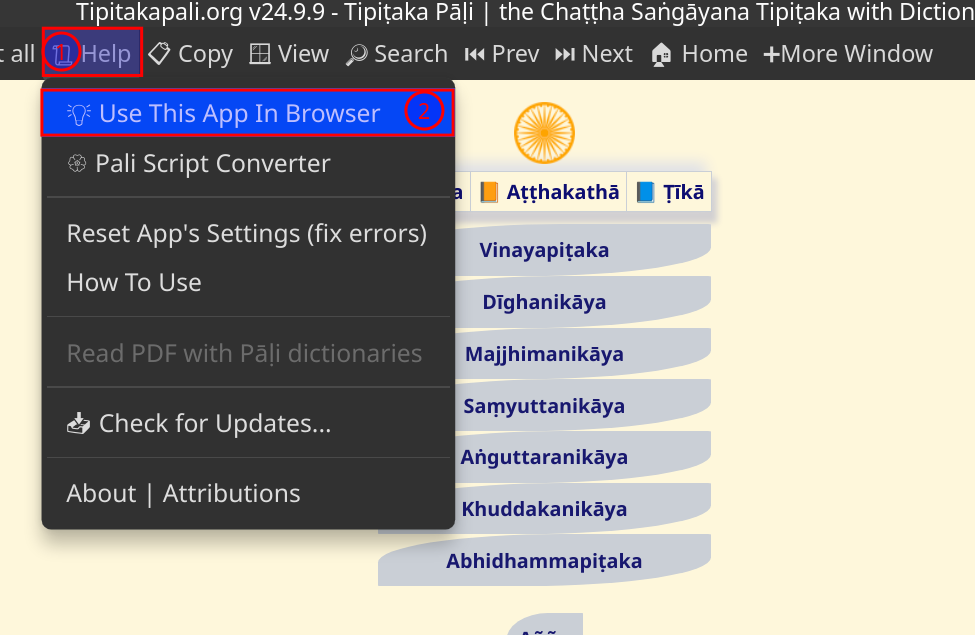
Tipitakapali.org Offline will then open in your default browser, just like when you access Tipitakapali.org online.
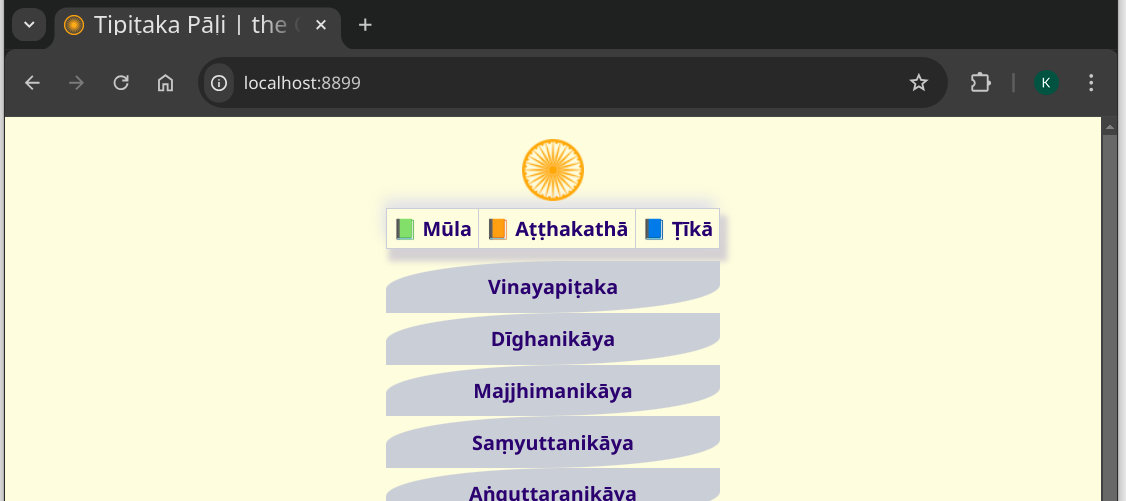
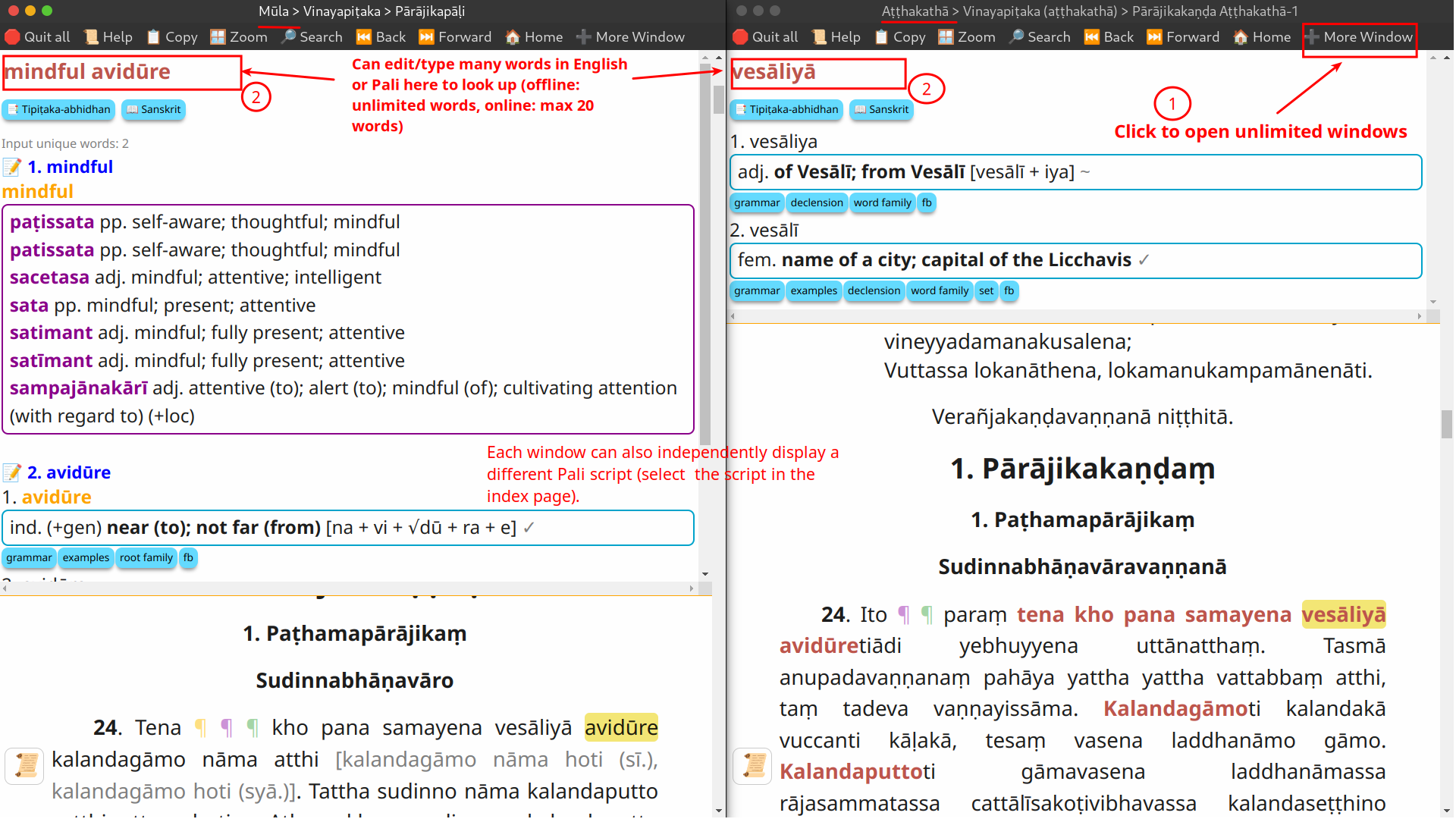
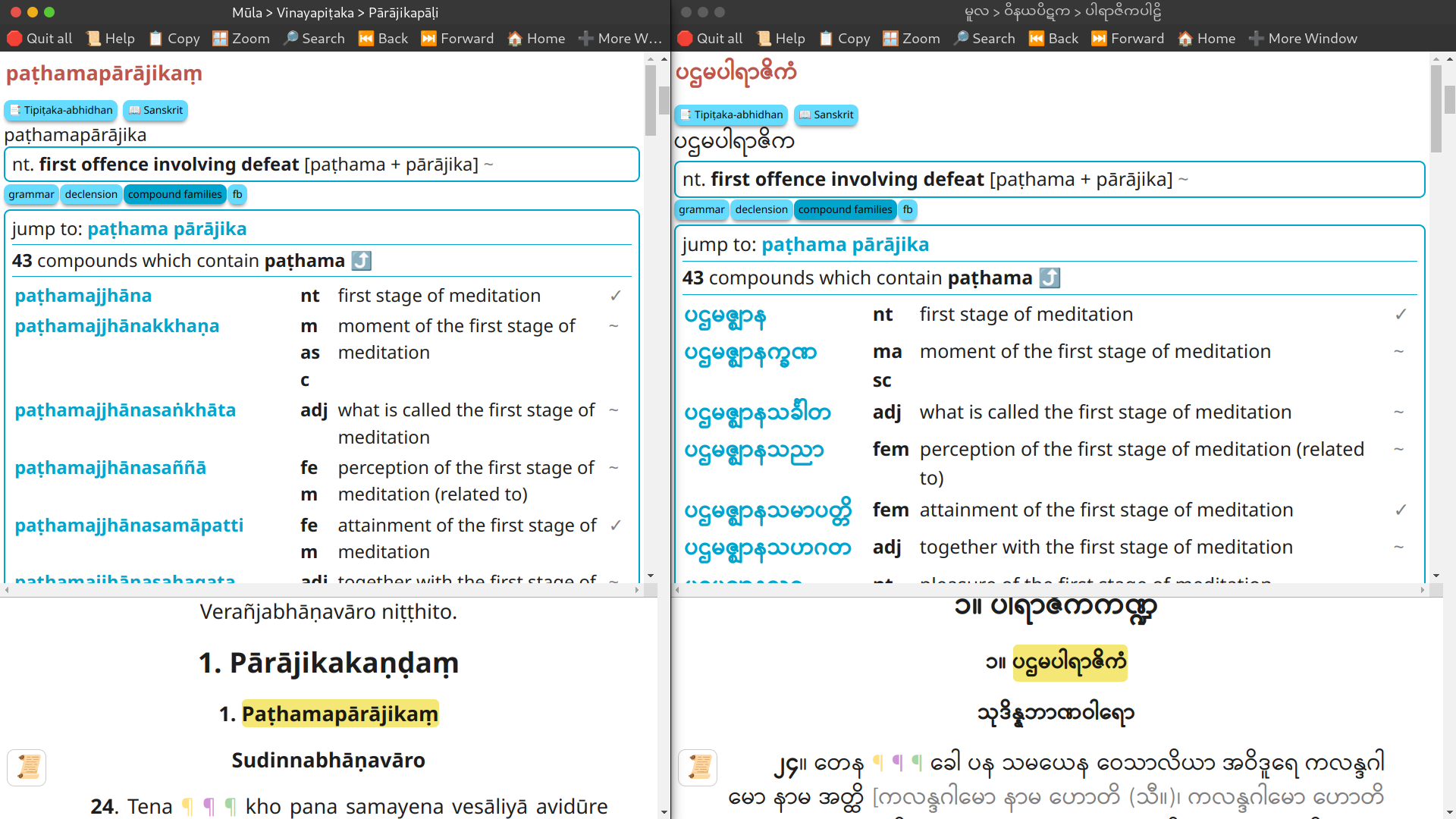
If you’re using Tipitakapali.org through a web browser, simply right-click (or long-press on mobile) any link and select Open link in new window. You can open as many windows as you’d like! :)
The apps published on the Apple Store and Google Play Store are under our kappiya’s account. They kindly helped to publish them as Dhamma dāna for free, so please be considerate and refrain from requesting additional features there.
If you find any bugs or have suggestions related to this app, you may try emailing us at tipitakapali.org @ gmail.com or simply ignore them :) or use other apps.
For a peaceful mind, it’s best not to expect a quick/or any response from me. Please keep it simple!
As required by some adapted materials, the app is generally distributed under the Creative Commons Attribution-NonCommercial-ShareAlike 3.0 License. For more details, please see the CC BY-NC-SA 3.0 Legal Code and the CC BY-NC-SA 3.0 Summary.
However, for other materials (except the Sanskrit-English Dictionaries mentioned below or unless otherwise noted), like the text, they can be used under Creative Commons Attribution-NonCommercial 4.0 License. This does not override the original material owner’s license in case of conflict. If you found something out of place, please inform us via: tipitakapali.org @ gmail.com
Attributions below and read info.html for more info.The digital pāḷi tipiṭaka text is adapted from the Tipitaka.org XML files obtained from this git repo: https://github.com/VipassanaTech/tipitaka-xml. For sub chapter split we used and followed https://tipitaka.org/romn/
Tipitaka.org XML files These files are made freely available for non-commericial use. Please attribute Vipassana Research Institute when incorporating these files into your projects.
Powerful Pali Script Converter - a library for transliterating pāḷi across multiple scripts.
Tipiṭaka Pāḷi-Myanmar Dictionary data is adapted (with modifications) from Tipitaka App & Tipitaka Abidan both developed by Ven. Pn Daza.
The digitalised data is not complete (and likely will not be complete in the near future). So for full word entries, please see the original printed dictionary books, or scanned ones via Tipitaka Abidan app (24/25 volumes, as of 2022).
Digital Pali Dictionary - dict data, js, and csss are obtained from Digital Pali Dictionary, licensed under a Creative Commons Attribution-NonCommercial 4.0 International License.
This app can be also a convenient way for you to provide feedbacks to DPD. (Click on a button of each DPD word entry, the feedback link is at the end of the expanded content). See also DPD dictionary documentation.
The dictionary data in this app is adapted from Buddhadust’s ped.htm, retrieved on 30 Aug 2024. From Buddhadust: This work (ped.htm) is based on an scanned version of an early reprint of an early edition of The Pāḷi Text Society’s Pāḷi English Dictionary revised in accordance with the 2015 “Reprint with corrections” by K.R. Norman, William Pruitt and Peter Jackson.
Digitized Version of the Pāḷi Text Society’s Pāli-English Dictionary
Edited by T.W. Rhys Davids, F.B.A., D.Sc., Ph.D., L.L.D., D.Litt. and William Stede, Ph.D.
Corrected Reprint by K.R. Norman, William Pruitt, and Peter Jackson
Published by The Pāḷi Text Society Bristol 2015
Corrected reprint Copyright The Pāḷi Text Society - Commercial Rights Reserved Creative Commons BY-NC
This website / application uses data from Cologne Digital Sanskrit Dictionaries, Cologne University, accessed on November 14, 2023.
Copyright © 2014 The Sanskrit Library and Thomas Malten
All rights reserved other than those granted under the Creative Commons Attribution Non-Commercial Share Alike license available in full at creativecommons.org/licenses/by-nc-sa/3.0/legalcode, and summarized at creativecommons.org/licenses/by-nc-sa/3.0/. Permission is granted to build upon this work non-commercially, as long as credit is explicitly acknowledged exactly as described herein, and derivative work is distributed under the same license.
Monier-Williams’ Sanskrit-English dictionary, 1899 link
Apte’s Practical Sanskrit-English Dictionary, 1890 link
Edgerton’s Buddhist Hybrid Sanskrit Dictionary, 1953 link
https://commons.wikimedia.org/wiki/File:Tux.svg This file is made available under the Creative Commons CC0 1.0 Universal Public Domain Dedication. Attribution: [email protected] Larry Ewing and The GIMP
https://commons.wikimedia.org/wiki/File:Apple_logo_dark_grey.svg
https://commons.wikimedia.org/wiki/File:Windows_logo_-_2012.svg
Edited the original image from:
Royalty-Free photo: silhouette, photo, castle, trees, myanmar, burma, landscape, sunrise, morning, haze, mist
https://www.pickpik.com/silhouette-photo-castle-trees-myanmar-burma-40636
https://developer.apple.com/assets/elements/badges/download-on-the-app-store.svg
https://commons.wikimedia.org/wiki/File:Google_Play_Store_badge_EN.svg
.form-switch class is adapted from Realistic iOS Switch In Pure CSSWe hope that this app will be useful for you.
Be well and happy reading.